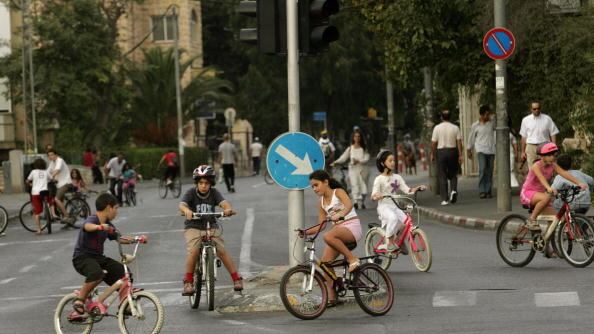Israel’s left-wing Meretz party ran another round of their Shabbat buses this past Friday night—this time in and around Jerusalem and Tel Aviv. An estimated 200 passengers enjoyed free service along three sponsored routes while Meretz brought the lack of public Shabbat transportation options in most places around the country into public consciousness. Meretz sees the issue as spanning environmental, economic, social and political concerns, Tom Wegner, a Meretz media consultant, told me. But Wegner refreshingly added an additional reason why the service is important, a reason not talked about nearly enough. “Most of the passengers were clearly drunk,” Wegner noted. “If they didn’t have this alternative, you can only imagine.”

Haifa, the city known for Arab-Jewish co-existence, has had bus transportation on Saturday mornings for decades. For Meretz, it’s now a matter of urging other city councils to make a request from the Ministry of Transportation to extend service. Tel Aviv’s council currently has a request pending with the Ministry. “Public transportation running only five days per week is not truly public,” Wegner added. For voters who care about the issue of a separation of religion and state, Wegner sees Meretz as being the only choice.
For my part, I can’t help but wonder, in the context of a Jewish state, how far the boundaries between religion and state should be pushed. Part of the beauty of the creation of the State of Israel was the idea that there would now be one country in the world that operated according to the rhythms of Jewish life. Sufganiyot (jelly doughnuts) are sold at bakeries during chanukah, spring break is held over Passover, Jewish holidays coincide properly with the seasons, and gone is the “December dilemma” that defines ordinary life for most Diaspora Jewish kids during Christmastime.
In short, does refraining from running buses on Shabbat serve to unify the country around the symbol of the Jewish week? Or is it a sign of religious oppression? When it comes to issues around public religious practice, should a “compromise” approach be taken, as Rabbi David Wolpe suggested recently regarding the controversy around women’s prayer at the Western Wall? Or is any compromise, when it comes to religious coercion, a betrayal of democratic values?
Perhaps the way to reason it out is that when it comes to religion and state, the issue of access to public services must trump religious symbolism. Citizens should be able to access civil marriage and divorce without having to turn religious authorities if they so choose. Religious citizens will still have the option. Similarly, while shabbat observant Jews won’t use public transport on Friday nights and Saturday mornings, other Jews—not to mention Muslims and Christian—may very well need it.
That said, there are some days when even the most strident voices for a separation of religion and state might retreat. Tom Wegner admits that Yom Kippur, for example, should remain bus-free. Observant Jews will spend the day fasting and atoning, and non-observant Israeli kids will still get to enjoy the annual Israeli tradition of riding bikes through the quiet streets. But then there’s still the controversial question of whether the automated bike-rental machines now dotting city corners will be allowed to operate on that sacred day.
Clearly, a serious conversation about religion and state in Israel, where the various sides respectfully lay out their dreams, visions and basic needs, remains to be had. Meretz is trying. Who is listening?




